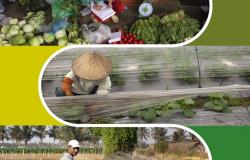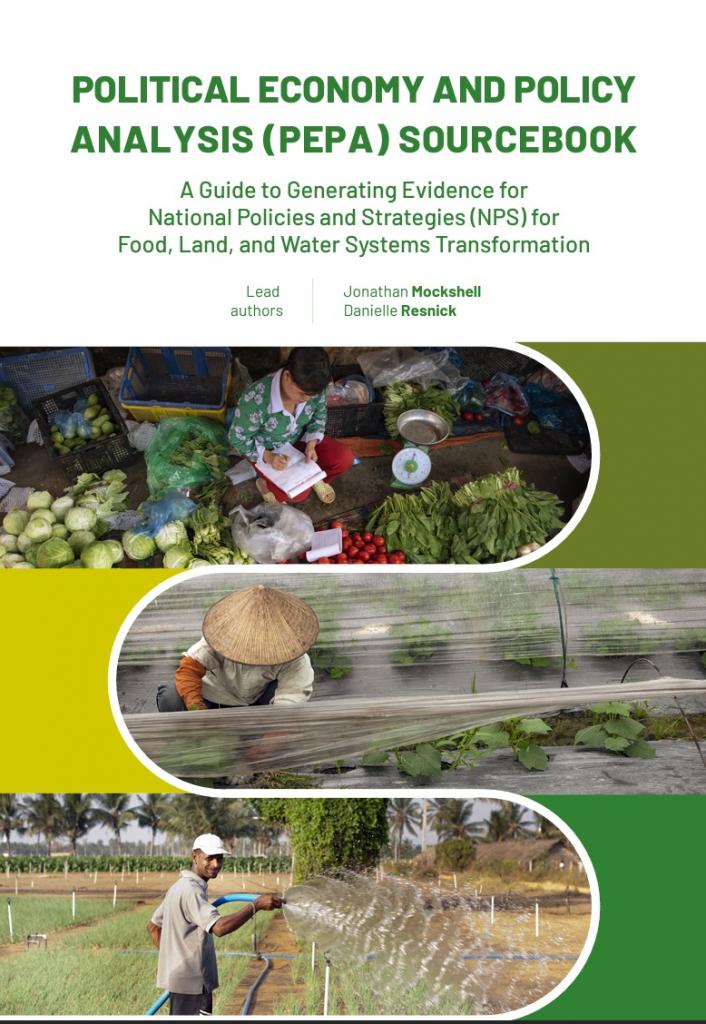How to design food, land and water policies to address hunger and climate change in today’s political economy

Jonathan Mockshell and Danielle Resnick, authors of a new Political Economy and Policy Analysis (PEPA) sourcebook, set out how governments can make use of a step-by-step guide to account for power dynamics, conflicting interests, coalitions and networks when developing agrifood policies. The book draws upon dozens of frameworks and tools to support policy development that addresses the dual challenges of food security and climate change.
Whether it’s the European Union’s Farm to Fork Strategy or India’s rice export ban, food and agriculture policies around the world are constantly evolving.
Sometimes, this is a reaction to new, external developments, such as the war in Ukraine or the impacts of extreme weather.
But food and agriculture policies are also regularly changing because too often, a lack of political will or institutional weaknesses mean they fail to achieve their objectives, even when technical analysis predicted their success.
In other words, even if policies are designed with good intentions to increase food productivity, safety, availability, or sustainability, their success will be limited without full attention to the unique political, economic and social realities that surround them.
 Food and agriculture policymakers and practitioners need a new, more rigorous way of designing policies that take into account power dynamics, conflicting interests, coalitions and networks, and the “rules of the game”. However, understanding how to incorporate these factors into agriculture and natural resource analyses can seem daunting without guidance about appropriate frameworks and examples of applications.
Food and agriculture policymakers and practitioners need a new, more rigorous way of designing policies that take into account power dynamics, conflicting interests, coalitions and networks, and the “rules of the game”. However, understanding how to incorporate these factors into agriculture and natural resource analyses can seem daunting without guidance about appropriate frameworks and examples of applications.
Our newly launched Political Economy and Policy Analysis (PEPA) sourcebook aims to fill this gap and equip researchers and policymakers with a systematic guide for integrating political economy considerations when designing and implementing policies to strengthen food, land, and water systems.
The PEPA Sourcebook, produced as part of the CGIAR Research Initiative on National Policies and Strategies (NPS), compiles dozens of frameworks and approaches for pursuing a variety of policy reforms, such as reforming farm subsidies, strengthening food safety regulations, and improving micronutrient programs.
This resource provides a new tool to help governments customise policies based on country-level circumstances to increase their impact on healthy diets, climate adaptation and the conservation of natural resources.
Produced using a PRISMA approach to systematically review almost 70 articles selected from an initial database of more than 1,200 search results, the book sets out more than 20 frameworks, eight analytical tools and five use case studies to help inform food and nutrition, land and water and climate and ecology policies.
Our step-by-step model first encourages policymakers to identify whether the policy question at hand relates most to food systems, land and water, or climate and ecology. Food systems encompass nutrition, health and food safety, as well as agricultural productivity, food availability and sustainability. Land and water, as two critical agricultural inputs, require well-designed policies that balance use, access and conservation. Meanwhile, climate and ecology both impacts and is impacted by agricultural activities.
Next, policymakers must understand whether their policy challenge is at the macro – or national – level, the meso-level of rules and incentives, or the micro level, relating to individuals. Understanding this will clarify whether policies need to account for broad historical contexts, cultural norms or individual winners and losers. Once this is understood, policymakers can make use of the dozens of frameworks and tools in the sourcebook to answer critical questions.
From a starting point of trying to understand what works, where and how, the PEPA sourcebook can help surface and address additional considerations, such as: “what role should governments play in agricultural transformation?” and “are input subsidy programs an effective strategy to increase agricultural productivity?”
Eventually, policymakers can refine the evidence to answer the question: “what are the ‘windows of opportunity’ for reform and policy change?”
Food and agriculture policies often focus on technologies and programs without paying enough attention to the broader political economy and social implications at the national level. But coherent and effective policies and program implementation must be tailored to meet national and societal needs, otherwise they are doomed to fail from the outset.
We believe that by first unpacking the policy environment through PEPA, it is possible to generate essential insights that support evidence-based policy processes and engagements across food, land and water policies.
As governments grapple with the multiple crises affecting food, land, and water systems, the PEPA Sourcebook provides a comprehensive resource that makes sense of the crowded field of approaches, frameworks and tools.
Jonathan Mockshell, senior agricultural economist at the Alliance of Bioversity International and the International Center for Tropical Agriculture (CIAT).
Danielle Resnick, senior research fellow at the International Food Policy Research Institute (IFPRI)


